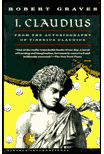Thursday, September 21, 2006
[Book Review] I, CLAUDIUS by Robert Graves
 Fiction/ Genre: Historical Fiction
Fiction/ Genre: Historical FictionRobert Cruthirds reviews I, CLAUDIUS by Robert Graves (1934):
After years of ruinous civil wars, Rome enjoyed a period of relative peace and prosperity under the reign on Augustus Caesar from 27 B.C. to A.D. 14. It was during this time that Tiberius Claudius Drusus Nero Germanicus was born to Nero Drusus and his wife Antonia the Younger (daughter of Marc Anthony and Octavia). Due to numerous physical infirmities and a tendency to stutter, Claudius was considered weak and incompetent, so his contact with the public was limited by certain family members who saw him as a source of potential embarrassment to Augustus and the royal family. In this account by Robert Graves, Claudius uses his isolation to his advantage by sharpening his intellectual skills and beginning to write a history of his family. As his book progresses, it becomes more autobiographical, particularly during the reigns of Tiberius and the mad Caligula, who Claudius succeeded in A.D. 41 after Caligula was murdered.
Readers who enjoy character-centered novels with detailed settings should not miss this thought-provoking work.
Robert Cruthirds, Randolph Branch Library
Labels: Historical Fiction


